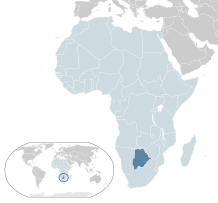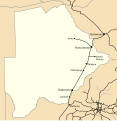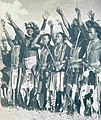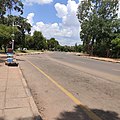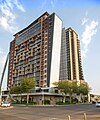Intro
Botswana, officially the Republic of Botswana, is a landlocked country in Southern Africa. Botswana is topographically flat, with approximately 70 per cent of its territory part of the Kalahari Desert. It is bordered by South Africa to the south and southeast, Namibia to the west and north, Zambia to the north and Zimbabwe to the northeast. With a population of slightly over 2.4 million people and a comparable land area to France, Botswana is one of the most sparsely populated countries in the world. It is essentially the nation-state of the Tswana people, who constitute nearly 80 per cent of the population. The Tswana ethnic group are descended mainly from Bantu-speaking peoples who migrated into southern Africa, including modern Botswana, in several waves before AD 600. In 1885, the British colonised the area and declared a protectorate named Bechuanaland. As part of the Decolonisation of Africa, Bechuanaland became an independent Commonwealth republic under its current name on 30 September 1966. Since then, it has been a parliamentary republic with a consistent record of uninterrupted democratic elections, although the Botswana Democratic Party has been the only ruling party from independence until 2024. As of 2024[update], Botswana is the third-least corrupt country in Africa, according to the Corruption Perceptions Index published by Transparency International. The economy is dominated by mining and tourism. Botswana has a per capita GDP (purchasing power parity) of about $20,158 as of 2024[update]. Botswana is the world's biggest diamond-producing country. Its relatively high gross national income per capita (by some estimates the fourth-largest in Africa) gives the country a relatively high standard of living and the second-highest Human Development Index of continental Sub-Saharan Africa (after South Africa). Botswana is a member of the Southern African Customs Union, the Southern African Development Community, the Commonwealth of Nations and the United Nations. (Full article...)
Selected article -
The history of Gaborone began with archaeological evidence in the area around Gaborone dating back to 400 BCE, and the first written accounts of Gaborone are from the earliest European settlers in the 19th century. Since the 1960s, when Botswana gained its independence from Britain and Gaborone became the capital, the city has grown from a small village in the Botswana scrubland to a major center in southern Africa. (Full article...) Did you know -
This is a good article, A-class article, featured list, or featured article, one of Wikipedia’s best work.
Botswana is a parliamentary republic in which the President of Botswana is both head of state and head of government. The nation's politics are based heavily on British parliamentary politics and on traditional Batswana chiefdom. The legislature is made up of the unicameral National Assembly and the advisory body of tribal chiefs, the Ntlo ya Dikgosi. The National Assembly chooses the president, but once in office the president has significant authority over the legislature with only limited separation of powers. The Botswana Democratic Party (BDP) rules as a dominant party; while elections are considered free and fair by observers, the BDP has controlled the National Assembly since independence. Political opposition often exists between factions in the BDP rather than through separate parties, though several opposition parties exist and regularly hold a small number of seats in the National Assembly. Botswana achieved independence from the United Kingdom in 1966. The BDP led by Seretse Khama formed the first government, and continued winning elections every five years. Quett Masire became president following Khama's death in 1980, and the BDP was enveloped by factionalism in the 1990s. This factionalism persisted through the presidencies of Festus Mogae from 1998 to 2008 and Ian Khama from 2008 to 2018. Khama's successor, Mokgweetsi Masisi, became president in 2018 and developed a strong political rivalry with Khama, which came to define politics in Botswana over the following years. (Full article...) General images -The following are images from various Botswana-related articles on Wikipedia.
Related portalsOther South African countriesReligion in BotswanaBotswana-related articlesCategoriesAssociated WikimediaThe following Wikimedia Foundation sister projects provide more on this subject:
| ||||||||||||||||||||||||||||||||||||||


